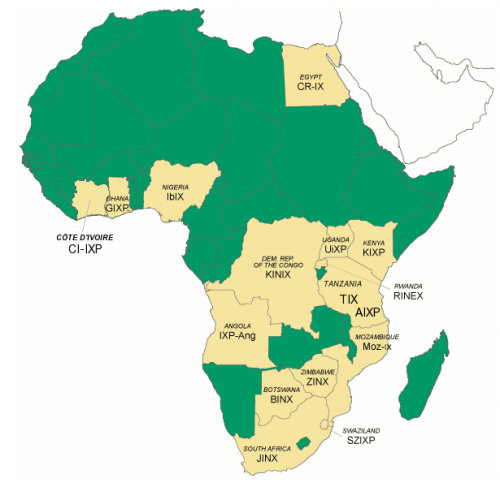Last week I talked about Google’s Global Cache, and how they will be housing this new project at Internet Exchange Points (IXP). A quote from Wikipedia’s definition explains the importance of IXPs best.
“The primary purpose of an IXP is to allow networks to interconnect directly, via the exchange, rather than through one or more 3rd party networks. The advantages of the direct interconnection are numerous, but the primary reasons are cost, latency, and bandwidth. Traffic passing through an exchange is typically not billed by any party, whereas traffic to an ISP’s upstream provider is.”
There are 18 IXPs in Africa in 15 countries (I stated 17 last week). A map of those countries is below (click on it to be taken to the interactive version):
Most of these are found in the capital of the country, but not always. For instance, iBiX is located in Ibadan, Nigeria not Abuja and Tanzania has two IXPs, one in Arusha and one in Dar es Salaam.
In list form, they are:
- Angola: IXP-ang
- Botswana: BINX
- Cote D’Ivoire: CI-IXP
- Dem. Rep. of Congo: KINIX
- Egypt: CR-IX and GPX
- Ghana: GIX
- Kenya: KIXP
- Nigeria: iBiX
- Mozambique: Moz-ix
- Rwanda: RINEX
- South Africa: JINX and GINX
- Swaziland: SZIXP
- Tanzania: TIX and AIXP
- Uganda: UiXP
- Zimbabwe: ZINX
There seems to be a definite advantage to having an IXP located in your country. Why then do so many African countries not have one? From my understanding, it isn’t cost prohibitive to create an IXP or to maintain it. Why would so many African nations, who all have local ISPs, not have a local IXP?
[Update: Michuki Mwangi, one of the godfather’s of Kenyan tech (I believe he’s responsible for getting Kenya’s TLD: yourdomain.co.ke), responded with the following answers to my question.]
“Most of the reasons that countries dont have IXPs are non-technical and are either policy or politics. For instance in Senegal, Sonatel the Senegalese Telco operates in a monopolistic environment. There are almost no ISPs that exist there and those that do just resell ADSL links for the telco. In such a case, they own no infrastructure or services outside what the telco provides. Therefore, there’s been no need/demand for such. A similar case exists in Ethiopia.
In other countries like Nigeria, its getting the players to agree and look beyond the mistrust and competitive advantages that others have to form one. That takes a while.
In other countries its purely a regulatory policy issue that does not permit the existence of an IXP – its as a way of protecting the incumbent telco’s.”
If you are interested in finding out more about Africa’s IXPs, here are some resources:
AfrISPA – African Internet Server Provider Association
AfNOG – African Network Operators Group
EP.net – Africa – List of African IXPs with links
Packet Clearing House (PCH) – for information, statistics and locations
AfriNIC – African Internet Numbers Registry IP Addresses (IPv6)
